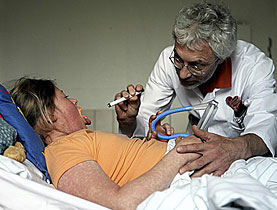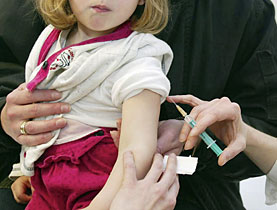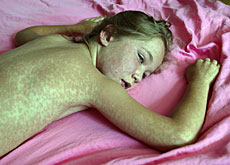
Measles debate flares up again

An upsurge in the number of measles cases reported in Switzerland this year is worrying health officials, who hoped the 2008 epidemic had run its course.
The Conference of Cantonal Health Directors said on Monday that mandatory vaccination might have to be considered if current methods did not stop the disease spreading.
More than 90 cases have been reported since the beginning of January. This is far from the peak of March 2008, when 572 cases were registered, but still a cause of concern.
It could indicate that the epidemic which started in November 2006 is making a comeback, according to Daniel Koch, head of the division of communicable diseases at the Federal Health Office. The epidemic was officially declared to be over in September.
The main centres of infection are schools, especially those where a large number of pupils have not been vaccinated.
In the western canton of Vaud the authorities are pointing to a private Steiner school as the source of an outbreak which has affected about 60 people, 49 of them pupils at the school.
Many parents who send their children to such schools oppose vaccination. They believe in the anthroposophical – spiritual – principles of Rudolf Steiner and believe diseases like measles to be part of childhood.
Only about 30 per cent of the pupils of the school involved are thought to be vaccinated, according to Eric Masserey, deputy cantonal medical officer. The average rate among adolescents in Vaud as a whole is 93 per cent.
Compulsion
In Switzerland, as in other European countries, measles vaccinations have been routine since the 1980s but have never been compulsory.
It is, however, mandatory for doctors to report cases of measles to the cantonal health authorities. The individual cantons are responsible for deciding what measures to take in emergencies.
Given the seriousness of the situation in Vaud, the cantonal health minister, Pierre-Yves Maillard, has asked his officials to examine the pros and cons of making vaccination mandatory.
Koch pointed out that in 93 per cent of the cases recorded in recent years the sufferers had been insufficiently vaccinated or not at all. This was also the case of a 12-year-old French girl who died in Geneva in January.
“People must stop saying these diseases are completely benign here,” he said. However, the health office believes that persuasion is preferable to compulsion.
Parental responsibility
One group that will not be persuaded is Aegis, which believes that vaccination damages the body’s natural immune system. Spokeswoman Anita Petek told the Swiss news agency that the group would fight any efforts to oblige children to be vaccinated.
A mother who opposes vaccination told French-language television that she was also concerned about side effects and felt these were not sufficiently publicised.
However, a representative of the cantonal parents’ association speaking on the same programme warned that the question was not simply a personal one.
“Parents need to know what is at stake, but, more importantly, they must be aware of the consequences their decision will have not only on the health of their own child, but on the community as a whole,” she said.
No panacea
The World Health Organization believes that Europe could wipe out measles in 2010 if 95 per cent of the population were vaccinated.
The rate in Switzerland is estimated at 86 per cent on average, but in some of the German-speaking cantons it drops to 70-75 per cent.
However, many medical experts are wary about imposing compulsory vaccination and do not believe it would be a total solution.
“It’s a measure that would be part of the global strategy that we need to redefine,” Koch explained. “Making something compulsory implies making exceptions. And if parents are not convinced, they will do all they can to be included among those exceptions.”
swissinfo, based on an article in French by Carole Wälti
Switzerland experienced a measles epidemic beginning in November 2006, which reached a peak in March 2008.
The Swiss health office registered 73 cases in 2006, 1,098 in 2007 and 2,195 in 2008. Of these, there were complications in about 500 cases, mainly pneumonia.
In years when there is no epidemic, Switzerland usually has about 50 cases.
More than 12,000 cases were recorded in Europe in 2006 and 2007.
In industrialised countries mortality linked to measles is at one to three people per 10,000 cases. But in developing countries it may reach 300-500 per 10,000 cases.
Measles is a highly contagious viral disease. The first sign is generally a high temperature; after a few days the body is covered in a red rash.
In some cases it can lead to complications, including blindness, encephalitis, acute diarrhoea, ear infections and infections of the respiratory tract, including pneumonia.
The health office recommends children receive a first dose of MMR (measles, mumps, rubella) vaccine at 12 months and a second dose between 15 and 24 months.
There is no drug which can cure measles.

In compliance with the JTI standards
More: SWI swissinfo.ch certified by the Journalism Trust Initiative







































You can find an overview of ongoing debates with our journalists here . Please join us!
If you want to start a conversation about a topic raised in this article or want to report factual errors, email us at english@swissinfo.ch.